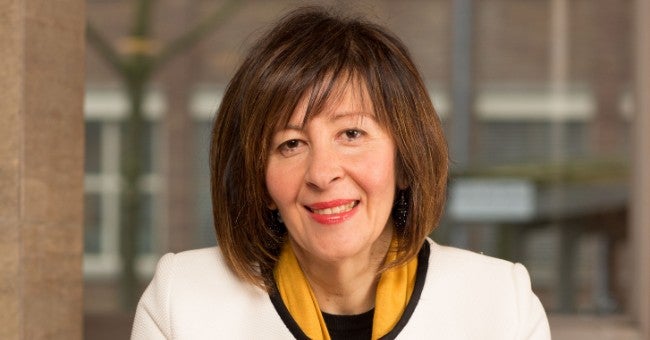Just one day before the first Dutch person tested positive for the new coronavirus, Aura Timen, professor at the VU and Head of the National Coordination Centre for Communicable Disease Control at the RIVM, was interviewed by the Volkskrant. She talked about her work and what her days at the RIVM involved, following the arrival of the new coronavirus in Europe. How does she look back on that day now, a month later?
“It feels like it was a year ago. That day was like an oasis of calm compared to what it’s like now and what we’re experiencing. It’s almost too chaotic for words.”
We now have all kinds of measures in place in the Netherlands that are intended to contain the virus. What is the role of the RIVM in this?
“We advise the government on the measures to be taken, and we have the task of coordinating the implementation of these measures. We run the Outbreak Management Team for this purpose, which is the body that in times of crisis provides substantive recommendations on combating an epidemic. This team monitors the spread of the virus and determines what is necessary to contain it. We also keep an eye on what’s happening in other countries that are ahead of us in terms of the development of the outbreak.”
“It remains a delicate balance – you don’t want to completely paralyse society, but you do need to do what’s necessary to slow the spread of the virus.”
“Measures were adopted locally first in North Brabant, but it soon became necessary to introduce these measures throughout the rest of the Netherlands. It was clear to us that if we didn’t take action now, we’d have a problem with healthcare capacity within a number of weeks. We want to avoid ending up in the same situation as Italy, where the healthcare system is completely overburdened at the moment. It remains a delicate balance – you don’t want to completely paralyse society, but you do need to do what’s necessary to slow the spread of the virus and reduce the chance of elderly and vulnerable patients catching the infection. They are the most at risk of complications and death. A new set of measures applies to each phase.”
And the remarkable thing in all of this is that the Netherlands has not gone into total lockdown, unlike many other European countries.
“If you lock everything down, you’ll still feel the impact later on. And you can’t keep everything shut down for a year. The virus isn’t going to disappear, it’s just going to keep circulating among the population. It’s just that right now it’s new to everyone. To be able to manage the consequences to some extent, you have to have a basic immunity in the population. This also indirectly protects elderly and vulnerable people. A total lockdown doesn’t enable this to occur.”
“The coronavirus is here to stay.”
“The one extreme is to do nothing, because you don’t know that there’s a problem yet – just like Italy when it all started. Then the hospitals and ICUs fill up rapidly, and the mortality rate skyrockets. The other extreme is China – they did everything there, shut down everything to contain the virus. They’re now going to slowly relax the measures. I’m watching the developments there with a great deal of interest. But either way, the virus is here to stay.”
Can the Dutch healthcare system handle this?
“Everything depends on the capacity of hospitals to admit patients and to provide seriously ill patients with beds in the ICU and artificial respiration; that is the most important issue during this outbreak. At the moment, staffing doesn’t seem to be the biggest problem; additional help is arriving from all quarters. The great thing is that this crisis is connecting people. Hospitals are now looking at how they can increase the capacity of the ICUs, for example by postponing non-emergency surgeries. Things are very busy in North Brabant, and by the time that this interview comes out, there will probably have been a request to distribute patients from North Brabant to other hospitals in the north, where it is currently very quiet.”
Was it a wise decision to close all the schools in the Netherlands?
“That was a policy decision that took into account several arguments. Our substantive argument is that children do not seem to contribute a great deal to the spread of the virus. This is also supported by the data from China. We are now in the process of starting up a study in North Brabant to further investigate the role of children in spreading the virus.”
When do you expect to see a result from all of the measures taken in the Netherlands? How rapidly is the curve expected to flatten?
“We’ll follow developments closely of course. I think we’ll see the first signs of flattening by the end of March, the start of April at the earliest. We particularly hope to see a reduction in the number of people admitted to ICUs.”
Will the mortality rate in the future also remain higher than for a normal flu?
“We don’t yet know how many people are actually being infected with this virus. So we need to do research, carry out serological studies to see how often the antibodies appear in people’s blood. This will give more clarity about the mortality rate.”
“We’re now seeing the effect of globalisation; that we travel a lot and the world is like one large village.”
The outbreak of the new coronavirus, SARS-CoV-2, has been officially declared a pandemic by the World Health Organization (WHO). How did they come to that decision?
“There are three conditions for this to occur. Firstly, the virus must be a new one that has not previously circulated among humans. So the population has no immunity to the virus. Secondly, the pathogen must be significantly pathogenic. And finally, the virus must be spreading on several continents. This virus has met these three conditions. We’re now seeing the effect of globalisation; that we travel a lot and the world is like one large village.”
“We’re working day and night and on every weekend. We’re always here.”
The swine flu in 2009 was also a pandemic. What’s the difference between then and now?
“The swine flu period was also extremely hectic for us. The difference with now is that the swine flu virtually disappeared during the summer. That’s what flu viruses generally do. We hope that the coronavirus will also do this, but we’re not completely certain about that yet.
In the summer of 2009, we prepared to administer mass vaccinations. When the virus re-emerged in the autumn, we already had enough of the vaccine in stock for a very large proportion of the population. We vaccinated a third of the population within two months. And that’s what we’re hoping for now too, that we can stretch things out for as long as possible, until a vaccine comes onto the market. Until that happens, we’ll be working day and night and every weekend. We’re always here.”
Does communication determine the extent to which the pandemic remains under control?
“Yes, if the message is clear and communicated in the right way, it can encourage people to exhibit the desired behaviour. Such as now – stay at home if you’re sick, keep your distance from each other, wash your hands often and thoroughly, don’t organise any parties for now, and we’ll see what the results of these measures are in the next three weeks.”
“The picture we’re getting now from the panel surveys we’re carrying out with Nivel is that Dutch people are confident, they are remaining relatively calm, and they are complying with the measures that have been imposed. Of course, social media use has intensified over the past few years. This means that people are much more closely connected with each other. If a European country adopts a far-reaching measure, online discussion immediately flares up.”
“In the end, Carnival did turn out to be a booster for the virus. That’s why there are still so many cases in Brabant and Limburg.”
The RIVM tweeted for a very long time, at least until early March: don’t worry everyone, there’s nothing wrong.
“And there was actually nothing wrong for a very long time. We monitored the risk estimates issued by WHO and the European Centre for Disease Prevention and Control (ECDC). Together with Erasmus MC, we’re characterising the coronaviruses we encounter in patients. These appear to not be directly related to patients from China, but to patients from Italy and a little later, Austria. Except for a few clusters in Germany and France, the scene in Europe was fairly calm until 21 February, when Italy was caught unawares by a large number of cases. We received a huge influx of viruses from Northern Italy. This coincided with the holiday period in the southern regions here, and then with Carnival. In the end, Carnival did turn out to be a booster for the virus. That’s why there are still so many cases in Brabant and Limburg.”
Isn’t this the ideal case study for the research you’re conducting as Chair of Responses to communicable diseases in global health at the VU?
“Yes, I think this outbreak is going to teach us a lot. However, in crisis periods you have to do everything you can to fight the disease, and that’s really what matters the most right now. My PhD students will do research wherever necessary and possible. In any case, my passion is infectious diseases – they certainly keep you on your toes. I’ve been in this profession since 1996, and I thought I’d seen it all. But what we’re going through now... no, I’ve never seen anything like it.”
BIO
Aura Timen (1966) has been Head of the National Coordination Centre for Communicable Disease Control at the RIVM since 2011. She is also Professor by special appointment to the chair of ‘Responses to communicable diseases in global health’.
Timen graduated as a physician from VU Amsterdam in 1995 and is a specialist and training physician in Society & Health (M&G). She holds a PhD from Radboud University Nijmegen and has extensive research experience in the fight against communicable diseases, both in the Netherlands and internationally. Timen participates actively in various national and international networks.








